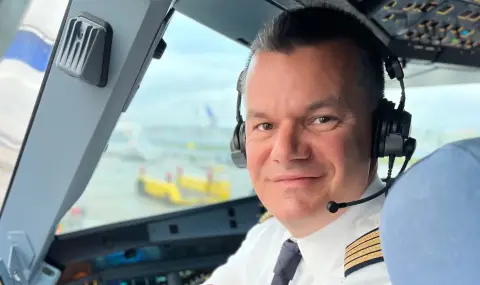Civil aviation is developing at a rapid pace, because increasingly safer airplanes are being made. Technologies are also being introduced, but it is about them that we will talk. We get on the plane with a laptop, a mobile phone, we charge them, we work. What risks does this hide, so that there are airlines that introduce restrictions… Captain Mario Bakalov speaks to FACT.
- Captain Bakalov, are there any braver men than pilots?
- Pilots are neither very brave, nor are they just men. Nowadays, the profession requires completely different qualities compared to aviation 40-50 years ago. Today's pilots rely mostly on the so-called “soft skills“. In aviation today, individuals are selected who avoid risk and are measured, cautious, with a strong sense of responsibility. Forget about Hollywood movies - they have nothing to do with reality. Also, in fact, more and more women are becoming pilots, and in some airlines even every tenth pilot is now a woman.
- You get on the plane and fly. When does flying become routine and you say to yourself: “I can do it, I know what I'm doing?“
- Despite the extremely good preparation in the form of constant training and rich experience, each flight is different and requires concentration. Therefore, I cannot confirm that a real routine ever develops. Additionally, at any moment a situation may develop that requires all our skills, so we have no right to relax and rely solely on experience and routine.
- You like to talk about aviation simply and clearly. You recently raised the issue of charging batteries – in phones, laptops, tablets, during a flight. What risks does this pose?
- Charging batteries during a flight is generally safe, as long as certain rules and restrictions are followed. The main risk comes from overheating of lithium-ion batteries, which are used in most electronic devices. If the battery is defective or damaged, it can overheat and even cause thermal runaway – a process in which the battery ignites spontaneously.
Therefore, airlines recommend:
- Do not charge devices that are damaged or overheated
- Do not leave devices unattended while charging
- Do not use non-original or low-quality chargers
- Power Banks (so-called “external batteries“) should be stored in HAND luggage, not in checked luggage, because if there is a problem, the crew can react quickly.
- Which are more risky - external batteries (Power Banks) or the devices themselves?
- PowerBanks are more risky than the batteries in the devices themselves,
because they have a larger capacity, weaker protection against overheating and are more vulnerable to shocks and damage.
In addition, cheap models often do not have good thermal regulation. Therefore, airlines only allow them in hand luggage and limit their capacity. If the PowerBank is damaged or overheats, the risk of ignition is higher compared to built-in batteries.
- Some airlines, such as Singapore Airlines and Thai Airways, have begun to prohibit the use and charging of Power Banks from the on-board electrical system. What is the basis for this ban, what arguments do they put forward?
- The ban on the use and charging of PowerBanks from the on-board electrical system is based on safety considerations. The main arguments of the airlines are:
-- risk of overheating and fire – lithium-ion batteries in PowerBanks can overheat or go into thermal runaway, especially if they are defective or of poor quality
-- unstable power supply – the onboard electrical system is not designed to charge external batteries and may lead to overvoltage or unstable charging
-- control and prevention – if the PowerBank is left unattended during charging and a problem occurs, it is more difficult for the crew to react quickly. Airlines implement these measures to minimize the risk of accidents on the plane
- Fire on board – how do you act in such a situation?
- There are two main actions that are taken in such cases, but they run in parallel. First, the pilots head to the nearest airport and prepare for an (emergency) landing. Second, the cabin crew searches for the cause and location of the fire and tries to extinguish it as quickly as possible with the means available on board. In a fire, every minute is crucial and well-coordinated actions are needed, which we, of course, constantly practice.
- Tell us about the online seminar on overcoming the fear of flying. How many people suffer from the fear of flying and how is it overcome?
- We conduct online seminars for people with a fear of flying, where together with an aviation psychologist we explain how aviation and the human psyche work, what the safety mechanisms are and how to manage anxiety. About 40-50% of people experience some form of fear of flying, and 10-20% have severe discomfort. Overcoming it is done through information, relaxation techniques and gradual exposure. My goal is to help participants fly more confidently and calmly.
